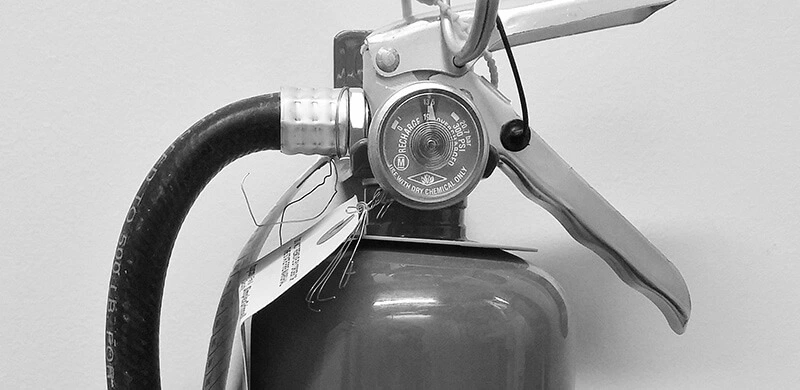"An ounce of prevention is worth a pound of cure."
The old saying might sound like something out of a Disney movie, but we have seen first-hand how fire safety tips can help save commercial building owners thousands of dollars each season. Now that we’re coming into Winter, let’s take a look at some key ways you can prevent fires at your commercial properties this coming season.
If you’re a homeowner, you’ve probably been told to regularly change out your air filters. Well, for commercial buildings, that is important but so is seasonal inspections of your equipment—especially heaters coming into Winter. Have a professional or trusted maintenance team member check your boiler and HVAC system prior to the lows of Winter.
When inspecting heating and cooling equipment for a commercial property, it is important to follow fire safety tips. Make sure flammable materials are not near any open flames or heat sources. Check that the system is properly ventilated to prevent build-up of hazardous gases and fumes. Ensure that all electrical outlets connected to the system are in good working condition.
Inspect all wiring and connections for fraying, cracking, or corrosion. Finally, check the temperature settings regularly to make sure they are operating within safe ranges. Following these simple steps can help keep your commercial property safe from potential fires caused by faulty heating and cooling equipment.
Additional fire safety tips include: keeping combustible material away from source of ignition; having a fire extinguisher on hand; making sure smoke detectors are installed and functional; and regularly checking ventilation systems. Taking proactive steps to ensure that the heating and cooling equipment in your commercial property is safe can protect you and those around you in the event of an emergency.*

If applicable, your commercial building’s fire suppression system can be your most important ally in case of a fire this Winter. Make sure that it is properly inspected and running. If you or your team have put off any annual maintenance or inspections of your system, please keep it up to date. Perform a test of any fire/carbon monoxide alarms throughout your properties regularly to ensure working order. Don’t forget to ensure your fire extinguishers are at the appropriate locations and ready to use. This type of preventative maintenance can also help keep your insurance costs down.
Regular inspection and maintenance of your fire extinguishers is an essential part of these fire safety tips. To ensure that your commercial property is safe, you must inspect your fire extinguishers regularly to make sure they are in good working condition. Here are some tips to help you inspect your fire extinguishers correctly:
1. Check the pressure gauge for your fire safety: All portable fire extinguishers have a pressure gauge or indicator on them which should be checked every month to ensure that the charge is within limits. If the gauge indicates a low pressure, do not attempt to recharge the extinguisher as it may cause it to burst - instead contact a qualified service technician.
2. Inspect for physical damage: Make sure there is no evidence of corrosion or other physical damage to the extinguisher. If any such damage is observed, immediately replace the extinguisher.
3. Check for obstructions: Check that there are no objects blocking access to the fire extinguisher or its operating instructions. It should be kept in a location where it can be accessed quickly and easily in an emergency situation.
4. Ensure proper labeling: Make sure all labels and signage remain with the extinguishers and are legible. The correct labels will indicate the type of fire risks which may occur at your premises and the rating of each fire extinguisher according to class of fire (A, B or C) as required by safety legislation.
By following these tips on how to inspect your fire extinguisher, you can help ensure that your commercial property is as safe and secure as possible. Remember to call in a professional service technician if you suspect any problems with your fire extinguishers - it is better to be safe than sorry!
For more on fire extinguisher regulation, check OSHA regulation.
Make sure that any rules regarding smoking inside or near your commercial buildings are being enforced. Also remind building occupants about policies and procedures as it relates to space heaters. Space heaters alone can be responsible for major building damage.
It's important to keep your employees and tenants safe by communicating the proper fire safety protocols in your commercial property. Here are some tips on how to do so:
1. Display Visual Reminders - Use visual reminders such as signs or posters throughout the property reminding people of key fire safety messages like "keep hallways clear," "exit in case of emergency," and "know where fire extinguishers are located." This can help ensure that everyone is aware of what to do if a fire breaks out.
2. Educate Employees & Tenants - Conduct regular training sessions with both employees and tenants on topics related to fire safety, such as evacuation procedures, the types of fires they may encounter, and how to properly use a fire extinguisher. This can help ensure that everyone is prepared in the event of an emergency.
3. Practice Fire Drills - Hold regular fire drills so that everyone knows what to do if a fire breaks out, and so they understand the evacuation route and procedures for getting out of the building safely.
By following these tips, you can ensure that your employees and tenants are aware of proper fire safety protocols and know how to act in the event of an emergency. Make sure to keep these reminders up-to-date and be sure to review them regularly with everyone in your commercial property to stay safe!
If you’d like to discuss how Rubicon can help with things like HVAC maintenance or facility management, contact us today.